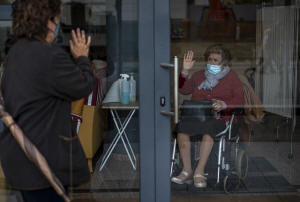WHO member countries agree on a draft 'pandemic treaty' to try to avoid
COVID-19 mistakes
[April 17, 2025]
By MARIA CHENG
LONDON (AP) — Five years after COVID-19 triggered national lockdowns,
economic uncertainty and killed millions, the World Health
Organization’s member countries agreed on a draft “pandemic treaty” that
sets guidelines for how the international community might confront the
next global health crisis.
After the world’s largely disastrous response to the coronavirus,
countries tasked the WHO with overseeing a pandemic treaty in 2021.
Negotiations concluded early Wednesday on an agreement expected to be
adopted next month at the U.N. health agency's annual meeting in Geneva.
WHO Director-General Tedros Adhanom Ghebreyesus heralded it as a
historic moment, saying countries have proven that “in our divided
world, nations can still work together to find common ground and a
shared response.”
Following U.S. President Donald Trump's decision to withdraw the country
from the WHO in January, American officials were barred from
participating in the talks by the Trump administration and are not
expected to sign the treaty.
During COVID-19, it was largely American research and development that
produced the most effective vaccines and medicines.
Weeks after Trump’s decision, Argentina’s President Javier Milei also
exited the WHO, citing “profound differences” with the U.N. agency.
Rachael Crockett, of the advocacy group Drugs for Neglected Diseases
Initiative, described the draft pandemic treaty as “a product of
compromise.” She said it contained strong provisions, but only if
countries chose to implement them: “This could change what we saw in
COVID, when some populations didn’t get access to what they needed.”

[to top of second column]
|

Angels Trepat, 59, says through a window goodbye to her mother
Angelina, 91, after visiting her at the Icaria nursing home in
Barcelona, Spain, Friday, Nov. 27, 2020. (AP Photo/Emilio Morenatti,
File)
 The draft treaty notably includes a
provision to guarantee that countries that share critical virus
samples receive any resulting tests, medicines and vaccines, with
the WHO to hold up to 20% of such products to ensure poorer
countries get supplies. Negotiations on this provision are expected
to continue after the treaty is likely accepted by member countries
in May.
Crockett acknowledged that, as is often the case with international
law, there are few consequences for countries that don’t comply:
“There’s not much that can be done if countries choose not to ratify
or abide by it.”
Yuanqiong Hu, of aid organization Doctors Without Borders, said that
if disputes arise between countries, the treaty includes a mechanism
for them to use diplomatic channels, followed by arbitration.
Countries are already legally bound by the International Health
Regulations to do things like quickly report dangerous new
outbreaks. But those have been flouted repeatedly, including by
African countries during Ebola and other outbreaks, China in the
early stages of COVID-19 and arguably the U.S. amid its ongoing bird
flu epidemic.
All contents © copyright 2025 Associated Press. All rights reserved |